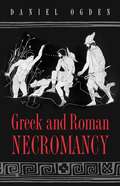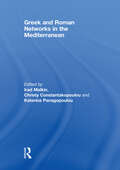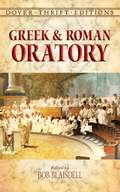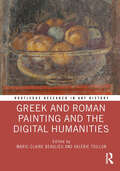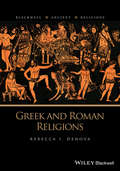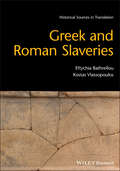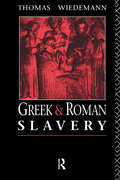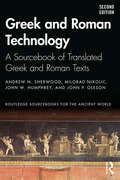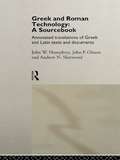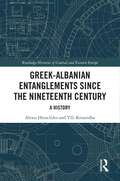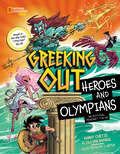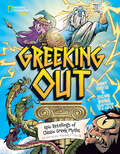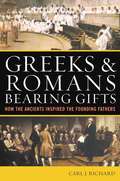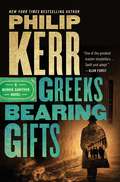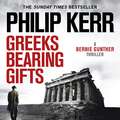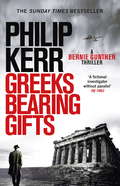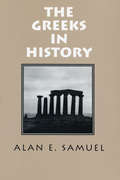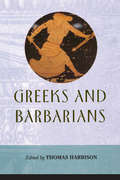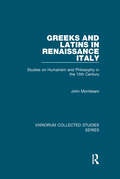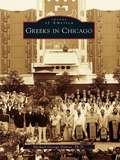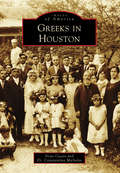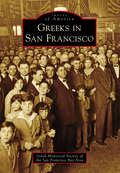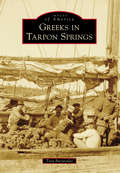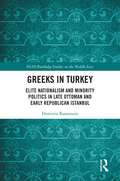- Table View
- List View
Greek and Roman Necromancy
by Daniel OgdenIn classical antiquity, there was much interest in necromancy--the consultation of the dead for divination. People could seek knowledge from the dead by sleeping on tombs, visiting oracles, and attempting to reanimate corpses and skulls. Ranging over many of the lands in which Greek and Roman civilizations flourished, including Egypt, from the Greek archaic period through the late Roman empire, this book is the first comprehensive survey of the subject ever published in any language. Daniel Ogden surveys the places, performers, and techniques of necromancy as well as the reasons for turning to it. He investigates the cave-based sites of oracles of the dead at Heracleia Pontica and Tainaron, as well as the oracles at the Acheron and Avernus, which probably consisted of lakeside precincts. He argues that the Acheron oracle has been long misidentified, and considers in detail the traditions attached to each site. Readers meet the personnel--real or imagined--of ancient necromancy: ghosts, zombies, the earliest vampires, evocators, sorcerers, shamans, Persian magi, Chaldaeans, Egyptians, Roman emperors, and witches from Circe to Medea. Ogden explains the technologies used to evocate or reanimate the dead and to compel them to disgorge their secrets. He concludes by examining ancient beliefs about ghosts and their wisdom--beliefs that underpinned and justified the practice of necromancy. The first of its kind and filled with information, this volume will be of central importance to those interested in the rapidly expanding, inherently fascinating, and intellectually exciting subjects of ghosts and magic in antiquity.
Greek and Roman Networks in the Mediterranean
by Irad Malkin, Christy Constantakopoulou and Katerina PanagopoulouHow useful is the concept of "network" for historical studies and the ancient world in particular? Using theoretical models of social network analysis, this book illuminates aspects of the economic, social, religious, and political history of the ancient Greek and Roman worlds. Bringing together some of the most active and prominent researchers in ancient history, this book moves beyond political institutions, ethnic, and geographical boundaries in order to observe the ancient Mediterranean through a perspective of network interaction. It employs a wide range of approaches, and to examine relationships and interactions among various social entities in the Mediterranean. Chronologically, the book extends from the early Iron Age to the late Antique world, covering the Mediterranean between Antioch in the east to Massalia (Marseilles) in the west. This book was published as two special issues in Mediterranean Historical Review.
Greek and Roman Oratory (Dover Thrift Editions)
by Bob BlaisdellThis inexpensive compilation of great oratory by ancient Greeks and Romans will be useful to students of history as well as those looking to hone their public speaking skills. Contents include Pericles' oration in favor of the Peloponnesian War and Julius Caesar on the punishment of the Catiline conspirators, in addition to speeches by Alcibiades, Demosthenes, Cicero, and many others.
Greek and Roman Painting and the Digital Humanities (Routledge Research in Art History)
by Marie-Claire Beaulieu Valérie ToillonThis volume is a groundbreaking discussion of the role of digital media in research on ancient painting, and a deep reflection on the effectiveness of digital media in opening the field to new audiences. The study of classical art always oscillates between archaeology and classics, between the study of ancient texts and archaeological material. For this reason, it is often difficult to collect all the data, to have access to both types of information on an equal basis. The increasing development of digital collections and databases dedicated to both archaeological material and ancient texts is a direct response to this problem. The book’s central theme is the role of the digital humanities, especially digital collection,s such as the Digital Milliet, in the study of ancient Greek and Roman painting. Part 1 focuses on the transition between the original print version of the Recueil Milliet and its digital incarnation. Part 2 addresses the application of digital tools to the analysis of ancient art. Part 3 focuses on ancient wall painting. The book will be of interest to scholars working in art history, classics, archaeology, and digital humanities.
Greek and Roman Religions (Blackwell Ancient Religions)
by Rebecca I. DenovaOffers an introduction to the basic beliefs, practices, and major deities of Greek and Roman religions A volume in the Blackwell Ancient Religions, Greek and Roman Religions offers an authoritative overview of the region’s ancient religious practices. The author—a noted expert in the field—explores the presence of divinity in all aspects of ancient life and highlights the origins of myth, religious authority, institutions, beliefs, rituals, sacred texts, and ethics. Comprehensive in scope, the text focuses on myriad aspects that constitute Greco-Roman culture such as economic class, honor and shame, and slavery as well as the religious role of each member of the family. The integration of ethnic and community identity with divine elements are highlighted in descriptions of religious festivals. Greek and Roman Religions presents the evolution of ideas concerning death and the afterlife and the relation of death to concepts of ultimate justice. The author also offers insight into the elements of ancient religions that remain important in our contemporary quest for meaning. This vital text: Offers a comprehensive review of ancient Greek and Roman religions and their institutions, beliefs, rituals, and more Examines how the Roman culture and religions borrowed from the Greek traditions Explores the ancient civilizations of the Mediterranean Basin Contains suggestions at the end of each chapter for further reading that include both traditional studies and more recent examinations of topical issues Written for students of ancient religions and religious studies, this important resource provides an overview of the ancient culture and history of the general region as well as the basic background of Greek and Roman civilizations.
Greek and Roman Slaveries (Blackwell Sourcebooks in Ancient History)
by Kostas Vlassopoulos Eftychia BathrellouGreek and Roman Slaveries Slavery was foundational to Greek and Roman societies, affecting nearly all of their economic, social, political, and cultural practices. Greek and Roman Slaveries offers a rich collection of literary, epigraphic, papyrological, and archaeological sources, including many unfamiliar ones. This sourcebook ranges chronologically from the archaic period to late antiquity, covering the whole of the Mediterranean, the Near East, and temperate Europe. Readers will find an interactive and user-friendly engagement with past scholarship and new research agendas that focuses particularly on the agency of ancient slaves, the processes in which slavery was inscribed, the changing history of slavery in antiquity, and the comparative study of ancient slaveries. Perfect for undergraduate and graduate students taking courses on ancient slavery, as well as courses on slavery more generally, this sourcebook’s questions, cross-references, and bibliographies encourage an analytical and interactive approach to the various economic, social, and political processes and contexts in which slavery was employed while acknowledging the agency of enslaved persons.
Greek and Roman Slavery (Routledge Sourcebooks for the Ancient World)
by Thomas WiedemannGreek and Roman Slavery brings together fresh English translations of 243 texts and inscriptions on slavery from fifth and fourth century Greece and Rome. The material is arranged thematically, offering the reader a comprehensive review of the idea and practice of slavery in ancient civilization. In addition, a thorough bibliography for each chapter, as well as an extensive index, make this a valuable source for scholars and students.
Greek and Roman Technology: A Sourcebook of Translated Greek and Roman Texts (Routledge Sourcebooks for the Ancient World)
by Andrew N. Sherwood John W. Humphrey John P. Oleson Milorad NikolicIn this new edition of Greek and Roman Technology, the authors translate and annotate key passages from ancient texts to provide a history and analysis of the origins and development of technology in the classical world. Sherwood and Nikolic, with Humphrey and Oleson, provide a comprehensive and accessible collection of rich and varied sources to illustrate and elucidate the beginnings of technology. Among the topics covered are energy, basic mechanical devices, hydraulic engineering, household industry, medicine and health, transport and trade, and military technology. This fully revised Sourcebook collects more than 1,300 passages from over 200 ancient sources and a diverse range of literary genres, such as the encyclopaedic Natural History of Pliny the Elder, the poetry of Homer and Hesiod, the philosophies of Plato, Aristotle, and Lucretius, the agricultural treatises of Varro, Columella, and Cato, the military texts of Philo of Byzantium and Aeneas Tacticus, as well as the medical texts of Galen, Celsus, and the Hippocratic Corpus. Almost 100 line drawings, indexes of authors and subjects, introductions outlining the general significance of the evidence, notes to explain the specific details, and current bibliographies are included. This new and revised edition of Greek and Roman Technology will remain an important and vital resource for students of technology in the ancient world, as well as those studying the impact of technological change on classical society.
Greek and Roman Technology: Annotated Translations of Greek and Latin Texts and Documents
by Andrew N. Sherwood Milo Nikolic John W. Humphrey John P. OlesonIn this volume the authors translate and annotate key passages from ancient authors to provide a history and an analysis of the origins and development of technology. Among the topics covered are:* energy* basic mechanical devices* agriculture* food processing and diet* mining and metallurgy* construction and hydraulic engineering* household industry* transport and trade* military technology.The sourcebook presents 150 ancient authors and a diverse range of literary genres, such as, the encyclopedic Natural Histories of Pliny the Elder, the poetry of Homer and Hesiod, the philosophy of Plato, Aristotle and Lucretius and the agricultural treatise of Varro.Humphrey, Oleson and Sherwood provide a comprehensive and accessible collection of rich and varied sources to illustrate and elucidate the beginnings of technology. Glossaries of technological terminology, indices of authors and subjects, introductions outlining the general significance of the evidence, notes to explain the specific details, and a recent bibliography make this volume a valuable research and teaching tool.
Greek-Albanian Entanglements since the Nineteenth Century: A History (Routledge Histories of Central and Eastern Europe)
by Alexis Heraclides Ylli KromidhaThis book is a comprehensive study of more than 200 years of the shared and interconnected histories of Greek-Albanian relations, a field of inquiry that has not attracted the international scholarly attention it deserves. The book presents and analyses in detail topics including the contested borderland (1800–1912), the Greek Revolution (1821–1830) and Greek-Albanian entanglements during it, Greek nationalism (identity and narrative), the Albanians (pre-modernism, belated nationalism, origin), the rise of Albanian nationalism, Albanian national identity and historical narrative, Greek-Albanian relations from the League of Prizren (1878) until Albania’s declaration of independence (1912), Greek irredentism (the "Northern Epirus Question", 1912–1920) and Albania’s precarious independence, Greek irredentism and Greek-Albanian relations (the "Northern Epirus Question", 1940–1971), the Greek minority in Albania, the Cham (Muslim Albanian) issue, the turbulent first part of the 1990s, the pending Greek-Albanian issues, and public opinion. It concludes with a road map for an eventual Albanian-Greek reconciliation. This volume will interest scholars and students of Southeastern Europe (Balkans), international and political history, political science and sociology. It will also be a valuable resource for diplomats, journalists, think tanks and other organizations and institutions involved in Greek-Albanian relations.
Greeking Out Heroes and Olympians (Greeking Out)
by Kenny CurtisINSTANT NEW YORK TIMES BEST SELLER! Get ready for 20 brand-new, tongue-in-cheek tales from Greek mythology, as told by the team behind the smash hit podcast.Want to know the greatest feats and the funniest secrets of the gods and heroes of Greek mythology? You&’re in the right place. Told in the hilarious, kid-friendly voice that&’s sent the Greeking Out podcast to the top of the charts, these stories of heroic victories, perilous adventures, and plain old mischief are sure to delight kids and adults alike. Plus, fans of the Percy Jackson series will love discovering the real myths behind their favorite (and least favorite) characters.In this book, you&’ll encounter a god kidnapped by pirates, sheep used as camouflage, a super-shiny fleece, some dangerous metalworking, the world&’s most perfect animal, a really heavy boulder, and much more.Dynamic, playful illustrations coupled with laugh-out-loud storytelling and real information about ancient Greece—delivered by the all-knowing Oracle of Wi-Fi—make this collection of fabulous fables an essential addition to your library. Complete your collection with Greeking Out: Epic Retellings of Classic Greek Myths.
Greeking Out: Epic Retellings of Classic Greek Myths (Greeking Out)
by Kenny CurtisFrom the creators of National Geographic Kids&’ wildly successful Greeking Out podcast, this New York Times best-selling tie-in book delivers a clever tongue-in-cheek retelling of 20 classic Greek myths.This kid-friendly collection of tales from Greek mythology showcases familiar favorites from the well-loved Greeking Out podcast as well as brand-new, never-before-aired stories. Join Persephone on her journey through the mystifying depths of the Underworld. Venture onwards with Heracles as he tackles his 12 death-defying labors. And join mythological figures you may not have heard of before, including scheming gods and goddesses, honorable—and not so honorable—heroes, and magnificent monsters.Dynamic, playful illustrations coupled with laugh-out-loud storytelling and real information about ancient Greece—delivered by the all-knowing Oracle of Wi-Fi—make this collection of fabulous fables a fresh addition to any history-lover's library.
Greeks And Romans Bearing Gifts: How The Ancients Inspired The Founding Fires
by Carl RichardThis lively and engaging book is the only popular work to explore the profound impact of Ancient Greece and Rome on the Founding Fathers. The classical education they imbibed as young students inspired them to undertake the American Revolution and influenced their approach to a host of constitutional and practical issues crucial to the shaping of the new American republic. Recounting the stirring stories the founders encountered in their favorite histories of Greece and Rome, renowned scholar Carl J. Richard explores what they learned from these vivid tales and how they applied these lessons to their own heroic quest to win American independence and establish a durable republic. Richard explains how the founders learned the importance of individual rights from the absence of those rights in Sparta, the superiority of republican government to monarchy from the Greek victory over the Persians, the perils of democracy from the instability of Athens, the need for a strong central government from the fall of Greece to Macedon and Rome, the importance of virtue to the success of a republic from early Rome, the need for eternal vigilance against ambitious individuals from the fall of the Roman republic, and the preciousness of liberty from its destruction by the Roman emperors. Crucial to the decisions that shaped the United States, these lessons remain invaluable today for every citizen concerned with America's future course.
Greeks Bearing Gifts (A Bernie Gunther Novel #13)
by Philip KerrA vicious murder puts Bernie Gunther on the trail of World War 2 criminals in Greece in this riveting historical thriller in Philip Kerr's New York Times bestselling series.Munich, 1956. Bernie Gunther has a new name, a chip on his shoulder, and a dead-end career when an old friend arrives to repay a debt and encourages "Christoph Ganz" to take a job as a claims adjuster in a major German insurance company with a client in Athens, Greece.Under the cover of his new identity, Bernie begins to investigate a claim by Siegfried Witzel, a brutish former Wehrmacht soldier who served in Greece during the war. Witzel's claimed losses are large , and, even worse, they may be the stolen spoils of Greek Jews deported to Auschwitz. But when Bernie tries to confront Witzel, he finds that someone else has gotten to him first, leaving a corpse in his place.Enter Lieutenant Leventis, who recognizes in this case the highly grotesque style of a killer he investigated during the height of the war. Back then, a young Leventis suspected an S.S. officer whose connection to the German government made him untouchable. He's kept that man's name in his memory all these years, waiting for his second chance at justice...Working together, Leventis and Bernie hope to put their cases--new and old--to bed. But there's a much more sinister truth to acknowledge: A killer has returned to Athens...one who may have never left.
Greeks Bearing Gifts: Bernie Gunther Thriller 13 (Bernie Gunther #13)
by Philip KerrBernie Gunther returns in the thirteenth book in the Sunday Times and New York Times bestselling series, perfect for fans of John le Carre and Robert Harris.'One of the greatest anti-heroes ever written' LEE CHILD'One of the greatest master story-tellers in English' ALAN FURST1957, Munich. Bernie Gunther's latest move in a long string of varied careers sees him working for an insurance company. It makes a kind of sense: both cops and insurance companies have a vested interest in figuring out when people are lying to them, and Bernie has a lifetime of experience to call on.Sent to Athens to investigate a claim from a fellow German for a ship that has sunk, Bernie takes an instant dislike to the claimant. When he discovers the ship in question once belonged to a Greek Jew deported to Auschwitz, he is convinced the sinking was no accident but an avenging arson attack. Then the claimant is found dead, shot through both eyes. It's a win for Bernie's employers at least: no one to pay out to even if the claim is genuine. But who is behind the murder, and why?Strong-armed into helping the Greek police with their investigation, Bernie is once again drawn inexorably back to the dark history of the Second World War, and the deportation of the Jews of Salonika - now Thessaloniki. As Europe seems ready to move on to a more united future with Germany as a partner rather than an enemy, at least one person in Greece is ready neither to forgive nor forget. And, deep down, Bernie thinks they may have a point.(P) 2022 Quercus Editions Ltd
Greeks Bearing Gifts: Bernie Gunther Thriller 13 (Bernie Gunther)
by Philip KerrBernie Gunther returns in the thirteenth book in the Sunday Times and New York Times bestselling series, perfect for fans of John le Carre and Robert Harris.'One of the greatest anti-heroes ever written' LEE CHILD'Kerr leads us through the facts of history and the vagaries of human nature' TOM HANKS'One of the greatest master story-tellers in English' ALAN FURST1957, Munich. Bernie Gunther's latest move in a string of varied careers sees him working for an insurance company. It makes a kind of sense: both cops and insurance companies have a vested interest in figuring out when people are lying to them, and Bernie has a lifetime of experience to call on.Sent to Athens to investigate a claim from a fellow German for a sunken ship, Bernie takes an instant dislike to the claimant. When he discovers the ship in question once belonged to a Greek Jew deported to Auschwitz, he is convinced the sinking was no accident but an act of vengeance. And so Bernie is once again drawn inexorably back to the dark history of the Second World War, and the deportation of the Jews of Salonika - now Thessaloniki. As Europe prepares to move on to a more united future with Germany as a partner rather than an enemy, at least one person in Greece is ready neither to forgive nor forget. And, deep down, Bernie thinks they may have a point.
Greeks In History
by Alan SamuelBreaking away from traditional chronological recitals of the Greek experience, this unusual new history relates the important events and personalities to themes of broad interest.
Greeks and Barbarians
by Kostas VlassopoulosThis book is an ambitious synthesis of the social, economic, political and cultural interactions between Greeks and non-Greeks in the Mediterranean world during the Archaic, Classical and Hellenistic periods. Instead of traditional and static distinctions between Greeks and Others, Professor Vlassopoulos explores the diversity of interactions between Greeks and non-Greeks in four parallel but interconnected worlds: the world of networks, the world of apoikiai ('colonies'), the Panhellenic world and the world of empires. These diverse interactions set into motion processes of globalisation; but the emergence of a shared material and cultural koine across the Mediterranean was accompanied by the diverse ways in which Greek and non-Greek cultures adopted and adapted elements of this global koine. The book explores the paradoxical role of Greek culture in the processes of ancient globalisation, as well as the peculiar way in which Greek culture was shaped by its interaction with non-Greek cultures.
Greeks and Barbarians
by Thomas HarrisonGreeks and Barbarians examines ancient Greek conceptions of the "other." The attitudes of Greeks to foreigners and there religions, and cultures, and politics reveals as much about the Greeks as it does the world they inhabited. Despite occasional interest in particular aspects of foreign customs, the Greeks were largely hostile and dismissive viewing foreigners as at best inferior, but more often as candidates for conquest and enslavement.
Greeks and Latins in Renaissance Italy: Studies on Humanism and Philosophy in the 15th Century (Variorum Collected Studies)
by John MonfasaniThe twelve essays in this new collection by John Monfasani examine how, in particular cases, Greek émigrés, Italian humanists, and Latin scholastics reacted with each other in surprising and important ways. After an opening assessment of Greek migration to Renaissance Italy, the essays range from the Averroism of John Argyropoulos and the capacity of Nicholas of Cusa to translate Greek, to Marsilio Ficino's position in the Plato-Aristotle controversy and the absence of Ockhamists in Renaissance Italy. Theodore Gaza receives special attention in his roles as translator, teacher, and philosopher, as does Lorenzo Valla for his philosophy, theology, and historical ideas. Finally, the life and writings of a protégé of Cardinal Bessarion, the Dominican friar Giovanni Gatti, come in for their first extensive study.
Greeks in Chicago
by Ph.D., Michael DavrosGreeks arrived in America with the expectation that freedom would permit their families to thrive and be successful. With hard work, belief in the Orthodox faith, and commitment to education, Greeks ascended in Chicago, and America, to positions of responsibility and success. Today Greek Americans are among the wealthiest and most successful of immigrant groups. Greeks recognized a historical imperative that they meet the challenges and aspirations of a classical Hellenic heritage. Greeks in Chicago celebrates the rich history of the Greek community through copious pictorial documentation.
Greeks in Houston
by Irene Cassis Constantina MichalosThis history of the Greeks in Houston is really the story of individuals who worked diligently to forge new lives for themselves even as they maintained their Greek identity and their Orthodox faith. The efforts of many of the founders are immortalized in the buildings that constitute the Annunciation Greek Orthodox Cathedral complex. Their names remind us of their hard work and commitment to establishing their koinonia (communion) in Houston. There are many other names that have gone unremarked over the decades but to whom we owe just as much for their tenacity and dedication. And there are the new generations who inherited this legacy and keep it vibrant through the stewardship of their faith and culture.
Greeks in San Francisco (Images of America)
by Greek Historical Society of the San Francisco BayThe history of San Francisco's Greek community is linked to the history of San Francisco. The first Greeks to arrive were sailors, miners, and laborers. By the 1880s, they had formed benevolent, civic, and fraternal organizations. In 1904, the first Greek Orthodox Church west of Chicago was established, and Third Street became the heart of the Greek community. The 1906 earthquake and fire destroyed much of their new community, but undaunted, the Greeks of San Francisco rebuilt their lives to become business leaders and politicians, contributing their entrepreneurial and philanthropic spirit to the city's rich heritage.
Greeks in Tarpon Springs (Images of America)
by Tina BucuvalasBeginning in 1905, large numbers of Greeks from the Dodecanese and Saronic Gulf islands settled in Tarpon Springs to work in the sponge business. They significantly expanded the industry and changed Tarpon Springs forever. Greektown flourished with residences, stores, churches, restaurants, and recreational facilities stretching from the sponge docks to downtown. Sponge fishing and related activities served as the economic base for the community. By 1913, as many as half of Tarpon Springs residents were reputedly Greek, and many businesses displayed both Greek and American flags. Today, Tarpon Springs' Greek community preserves a strong ethnic and maritime heritage. While some major US cities have a larger Greek population, no other has a greater percentage with Greek heritage than Tarpon Springs.
Greeks in Turkey: Elite Nationalism and Minority Politics in Late Ottoman and Early Republican Istanbul (SOAS/Routledge Studies on the Middle East)
by Dimitris KamouzisThis book provides a solid and critical historical examination of the endorsement, development and course of Greek nationalism among the lay/clerical leadership of the Greek Orthodox minority of Istanbul during the last phase of the dissolution of the Ottoman Empire and the first years of the newly established Republic of Turkey. The focus is on the political role played by the ethnocentric communal elite, who actively championed the Greek nationalist plan of the Megali Idea (Great Idea). Based on a comparative investigation and synthesis of a wide array of Greek and British archival sources the book engages with the various stages of Constantinopolitan Greek elite nationalism in Turkey and partly in Greece, and examines its manifestations, its level of success and its consequences on the minority during the crucial period of 1918–1930. The main argument is that the internal dynamics, the policies and the responses of this powerful communal elite vis-à-vis other communal factions as well as Greek irredentism and Turkish nation-building conditioned to a significant degree the construction of specific representations and perceptions of the group’s collective identity and determined the status of the Greeks of Istanbul as a national minority in Turkey until nowadays. Providing a thorough analysis of elite politics during and in the aftermath of the Greek-Turkish War and assessing the application of the minority clauses of the Treaty of Lausanne (July 1923), the volume is a key resource for students and academics interested in nationalism and minorities, modern Greek history, Ottoman and Turkish history as well as for policy makers and specialists working in the diplomatic field, the Greek and Turkish public service, international institutions and non-governmental organizations.
